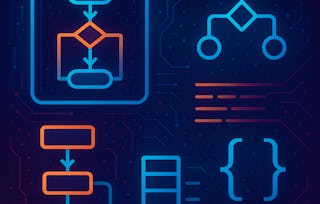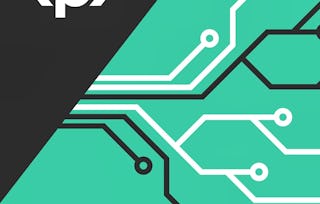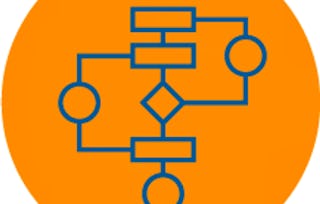This is the third course in the Amazon Junior Software Developer Professional Certificate. In this course, you will gain a deep understanding of various fundamental data structures and algorithms essential for building efficient and scalable software solutions. Starting with Advanced Data Structures, you'll explore arrays, ArrayLists, linked lists, stacks, queues, and maps, understanding their implementations, operations, advantages, and use cases. Moving on to Searching and Sorting Algorithms, you'll manipulate essential algorithms like linear and binary search, as well as various sorting algorithms, including bubble sort, insertion sort, selection sort, merge sort, and quick sort.

Data Structures and Algorithms

Data Structures and Algorithms
This course is part of Amazon Junior Software Developer Professional Certificate

Instructor: Amazon
20,151 already enrolled
Included with
56 reviews
Recommended experience
What you'll learn
Identify, implement, and analyze the efficiency and performance of basic data structures and algorithms in Java.
Apply principles of recursion in Java to solve complex problems.
Implement search and sorting algorithms in Java to optimize data processing and retrieval.
Skills you'll gain
Details to know

Add to your LinkedIn profile
15 assignments
See how employees at top companies are mastering in-demand skills

Build your Software Development expertise
- Learn new concepts from industry experts
- Gain a foundational understanding of a subject or tool
- Develop job-relevant skills with hands-on projects
- Earn a shareable career certificate from Amazon

There are 4 modules in this course
In this module, you'll delve into fundamental data structures in Java, including Arrays, ArrayLists, LinkedLists, Stacks, and Queues. You'll start by understanding the basics of Arrays, focusing on their efficiency and limitations. Then, you'll explore ArrayLists and LinkedLists to learn how these dynamic data structures offer flexibility in managing collections of data. You'll also cover Stacks and Queues, mastering their use in scenarios that require Last-In-First-Out (LIFO) and First-In-First-Out (FIFO) operations, respectively. This module equips you with essential skills to effectively implement and utilize these data structures in real-world applications.
What's included
21 videos13 readings5 assignments1 programming assignment5 ungraded labs
In this module, you'll explore advanced algorithms in Java, focusing on efficient data management and retrieval techniques. You'll begin with HashMap, TreeMap, and LinkedHashMap, learning how these structures optimize data storage and access. Then, you'll dive into searching algorithms, mastering both Linear and Binary Search for quick data retrieval. The module also covers a range of sorting algorithms, including Bubble, Insertion, and Selection Sort, as well as more advanced techniques like Merge Sort and Quick Sort. This module equips you with the skills to implement and optimize algorithms for enhanced application performance.
What's included
27 videos11 readings5 assignments1 programming assignment8 ungraded labs
In this module, you'll explore essential software testing practices, covering both manual and automated testing. You'll begin with the fundamentals of software testing, understanding its importance in ensuring code quality. Next, you'll dive into version control with Git and GitHub, learning how to manage and collaborate on code efficiently. The module also covers JUnit Testing, where you'll gain hands-on experience writing and executing test cases in Java. Finally, you'll delve into Test-Driven Development (TDD), mastering the approach of writing tests before code to ensure robust and maintainable software development.
What's included
13 videos4 readings4 assignments1 programming assignment2 ungraded labs
In this module, you'll apply your knowledge of data structures and algorithms to a small project, allowing you to solve real-world problems efficiently. You'll start by selecting appropriate data structures like Arrays, LinkedLists, or HashMaps for the project's requirements. As you progress, you'll implement algorithms for tasks such as searching, sorting, and managing data flows. The project will challenge you to optimize your solutions for performance and scalability, reinforcing your understanding of how to integrate data structures and algorithms into practical applications. This hands-on experience will solidify your skills in developing efficient and effective code.
What's included
4 videos3 readings1 assignment1 programming assignment
Earn a career certificate
Add this credential to your LinkedIn profile, resume, or CV. Share it on social media and in your performance review.
Explore more from Software Development
 Status: Preview
Status: PreviewBirla Institute of Technology & Science, Pilani
 Status: Free Trial
Status: Free Trial Status: Free Trial
Status: Free Trial Status: Free Trial
Status: Free Trial
Why people choose Coursera for their career

Felipe M.

Jennifer J.

Larry W.

Chaitanya A.
Learner reviews
- 5 stars
58.92%
- 4 stars
21.42%
- 3 stars
1.78%
- 2 stars
5.35%
- 1 star
12.50%
Showing 3 of 56
Reviewed on Feb 19, 2025
Some small errors in content, but overall well-presented and structured.
Reviewed on Jan 21, 2025
Provided a clear, engaging, and informative learning experience
Reviewed on Feb 25, 2025
I learnt very new things as a beginner but there are more topics like Trees , Graphs , more sorting and searching algorithms that are not covered , so besides it , the course is good.

Open new doors with Coursera Plus
Unlimited access to 10,000+ world-class courses, hands-on projects, and job-ready certificate programs - all included in your subscription
Advance your career with an online degree
Earn a degree from world-class universities - 100% online
Join over 3,400 global companies that choose Coursera for Business
Upskill your employees to excel in the digital economy
Frequently asked questions
This Professional Certificate is designed for aspiring junior software developers who are looking to kickstart their careers in the tech industry. It is also for current professionals that are seeking greater understanding of software development fundamentals.
This program is for you:
- If you are interested in the field of software development or just beginning to work in junior software development roles.
- If you want to switch or start a career in the field of software development
- If you already work in software development and are seeking a greater understanding of software development fundamentals, earning an Amazon software development certificate can help advance your career or help you address gaps in your knowledge, skills, and abilities.
While prior coding experience is beneficial, it's not mandatory. A basic understanding of programming concepts and a willingness to learn are recommended.
The primary advantage lies in acquiring practical skills and knowledge essential for launching a career as a junior software developer. This Professional Certificate not only equips you with the expertise needed for entry-level roles but also provides a recognized certification, bolstering your credibility within the industry. This credential offers hands-on learning experiences under the guidance of seasoned professionals.
A junior software developer usually supports software application design, development, and maintenance while receiving guidance from senior developers, making them suitable candidates for internships or apprenticeships.
More questions
Financial aid available,

